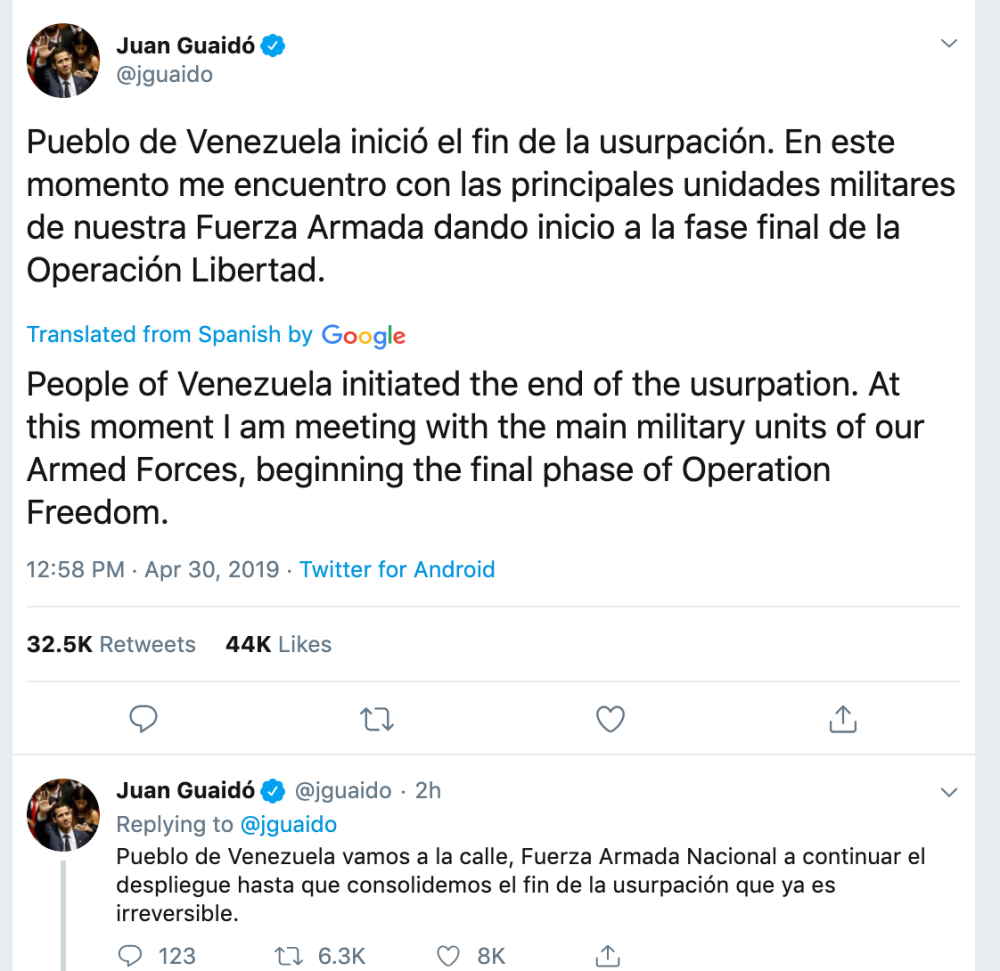
Gunfire erupted on Tuesday morning hours after Juan Guaido announced that military units backed him to begin the “final phase” of Operation Freedom to end the “usurpation” of the Maduro regime.
Guaido, who was declared president in January and has been recognized by numerous western countries, has opposed the continued rule of Nicolas Maduro who came to power in 2013 after the death of Hugo Chavez. Guaido has the backing of the National Assembly while Maduro has the backing of his own political structure, Russia, Turkey, Iran and also armed groups called Colectivos. He has been calling on them to keep order over the last month and now claims that Guaido has launched a coup. Just a day ago pro-Maduro media was claiming Guaido was making no progress. Now Guaido has crossed the rubicon.
Guaido, who is thirty-five years old, spoke while it was still dark before six in the morning. Soon he appeared with Leopoldo Lopez, another young opposition leader, who had been released from house arrest. Soldiers, reported to be from the National Guard, were seen on a bridge near the airport, their heavy-machine guns on an overpass and crates of bananas intermixed with belts of ammunition. Tear gas was fired in the air. By nine in the morning crowds were gathering, answering the call of Guaido to go to the streets to “recover our freedom.” Lopez called on “everyone to mobilize” to retake the people’s freedom.
Gunfire began around nine in the morning on the bridges near Carlota airport. Just south of Metrobus La Floresta station and north of the Carlota airport base. Crowds sheltered and dozens of journalists crouched behind cars. The National Guardsmen waited to return fire.
Venezuela is an important and symbolic conflict, not only because it pits the West against Russia to some extent, but also because it is an example of an authoritarian state that was once a democracy and has been beset by deep divisions, poverty and crime. When Chavez came to power he promised a revolution and he gained influence in the region, backed by Cuba and others. But his revolutionary zeal became more thuggish and ended up with Maduro who has clung to power. At the same time the opposition has made mistakes, boycotting various polls and not being able to unite until more recently. Now the young faces who have led this push give a new energy to Venezuela. At the same time they have received backing from the US, Columbia and Brazil.

Guaido had been declared president in January and had left Venezuela to help deliver aid in a stunt that ended with the burning of a truck on the Columbian border on February 23. Since then it was unclear if Guaido could mobilize a renewed push. Electricity blackouts have occurred across the country and the regime has appeared to entrench, counting on support from Moscow and elsewhere. While the regime has sought to stop social media access and block public transport, crowds gathered into the morning hours at Carlota base and appeared to force their way in. If they can take the base then aid could be delivered by plane, in theory. Many countries have recognized Guaido which ostensibly gives him the right to do as he wants with the airport.

US Senator Marco Rubio, a passionate supporter of Guaido says that after years the suffering and waiting for freedom can end for the people of Venezuela. “Do not let them take this opportunity from you,” he Tweeted. However US support for Guaido is tinged by politics at home. Congresswoman Ilhan Omar and others on the left have been critical of support for any regime change in Caracas. Elliot Abrams was appointed a US special envoy for Venezuela in January. He was supposed to lead efforts to isolate Maduro. Spain, which recently had an election, has called on the parties to avoid bloodshed in Venezuela, calling for a peaceful transition through a presidential election. Bolivia and Cuba have said a coup is underway.
US Secretary of State Mike Pompeo wrote, “Today interim President Juan Guaido announced start of Operación Libertad. The U.S. Government fully supports the Venezuelan people in their quest for freedom and democracy. Democracy cannot be defeated.”
Maduro’s regime narrative

The Maduro regime says that most of the country is quiet and that they will restore order. They have tried to downplay the issue, as they have sought in the last weeks to portray Guaido as having no influence or momentum. Maintaining momentum was always an issue for Guaido. Even with recognition by dozens of countries.
The Maduro regime has the support of Russia and Turkey, two countries that know about coups, one stopped one and one has a leader who saw the chaos of the 1990s. That works in Maduro’s favor because the western countries who like Guaido aren’t really experts at this. The Maduro regime must have known this could happen, they have faced real and imaginary coups in the past.
What about the airport
Imagines appeared to Show Guaido’s protesters entering the airport. If he could secure an airport that would be important. But he would have to move swiftly and have a plan. The question is if the international community would fly aid in or support.
If the pro-Guaido troops have the Carlota airbase and Guaido is recognized by some countries as leader, in theory he can fly in aid, other things, or fly out if things go badly. But if that’s the strategy, let’s see, usually one must move quickly in this situation.
There is another issue at play here which is that Maduro had sought to withdraw from the OAS just days ago. Potentially Guaido could call for outside support. He has support from Colombia and the US and others already. But no one wants a real conflict. It’s clear that this is the case. So these tense times will continue, but has Guaido crossed the Rubicon. How can he go back from this?

